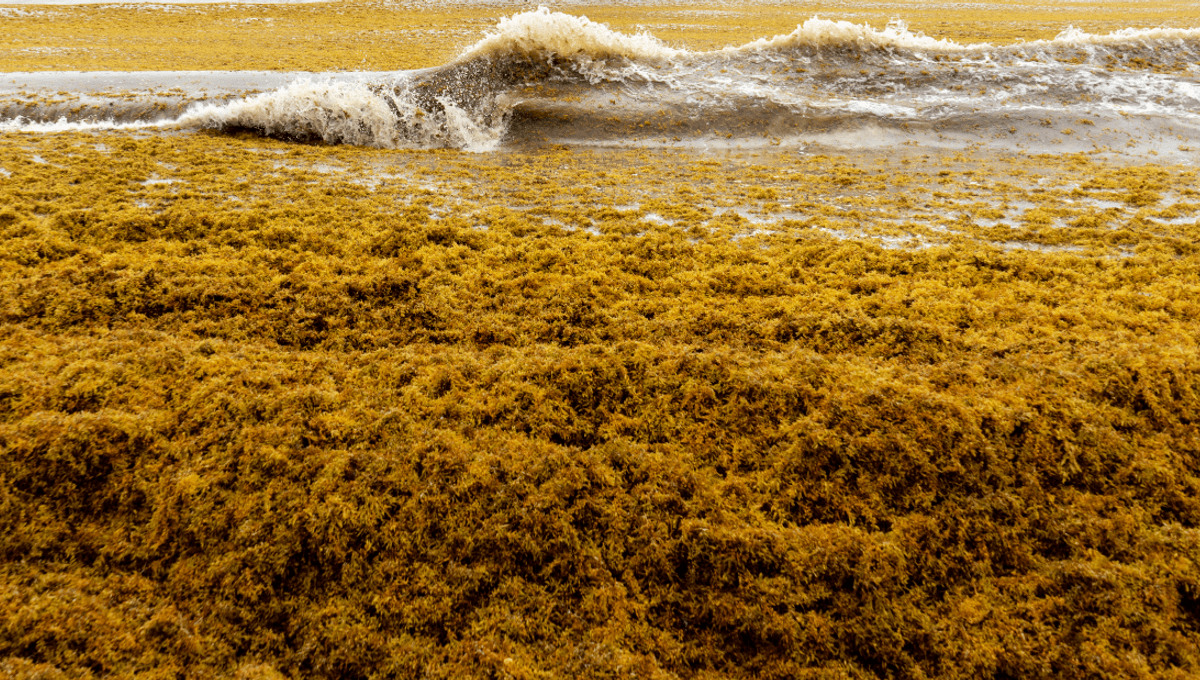
Coastlines across the globe are preparing for gargantuan blobs of sargassum seaweed that are on their way after accumulating in the Atlantic Ocean. The bloom was expected to bring with it millions of tons of odorous algae to the Caribbean and parts of Florida, and now reports suggest it could be the largest seaweed blob to journey across this part of the Earth on record.
The algae normally reside in the Sargassum Sea, hence the name, where it acts as a valuable habitat for marine life young and old (it’s actually where turtles spend their “lost years” at sea). However, a combination of climate change and pollution is thought to have triggered super blooms in sargassum production in recent years, sending dense mats far and wide.
Florida has been on the receiving end of these sargassum mats for years, sometimes seeing a lot wash ashore and other years slightly less so. It looks as though 2023 may be a record-breaking year, however, as the region’s already seen so much despite not having yet reached the peak season, which tends to fall in June and July.
“The Sargassum quantity in the Great Atlantic Sargassum Belt (extending from west Africa to the Gulf of Mexico) continued the overall increasing trend, again setting a record abundance (~13 million tons) for this time of year,” according to a March 2023 bulletin from the University of South Florida.
“Such a record-high quantity for the month of March is mostly due to Sargassum in the central East Atlantic. In the central West Atlantic, the Caribbean Sea, and the Gulf of Mexico, Sargassum quantity all exceeded the 75th percentile for the same month between 2011 and 2022 but did not reach the historical record. As a result, major beaching events are inevitable around the Caribbean, along the ocean side of Florida Keys and east coast of Florida, although the exact timings and locations are difficult to predict.”
Sargassum is a genus of brown macroalgae (the fancy word for seaweed) that’s found in temperate and tropical oceans across the globe. It can form giant clumps like floating islands that stretch for miles, providing shelter and food to birds, fishes, sea turtles, and crustaceans.
These gargantuan seaweed islands are the exclusive home for some species like sargassum fish, and act like nursery grounds for juvenile animals including mahi mahi and turtles. Eventually, these islands lose their buoyancy and sink to the seafloor where they become a primary food source in the food webs of the deep sea, so they are an important habitat for many species across different zones of the water column.
However, in recent years sargassum has become increasingly nomadic as warming ocean temperatures have seen it blossom in unfamiliar waters. It’s also thought to have experienced a boom in growth as a result of climate change and nutrient runoff from the Amazon and Mississippi. Its emigration and boom in growth means that it can sap the nutrients and oxygen out of the reefs it engulfs, and things only get worse when it makes ground.
“Golden tides” like the sea of sargassum that’s currently floating towards Florida can stink to high heaven of a potent blend of rotten eggs (thank you hydrogen sulfide gas) topped off with a salty sea tang. As it decomposes, it releases its stored carbon into the air, contributing towards the planet’s already-too-high CO2 emissions.
Keep a weather eye on the horizon, Florida. Something stinky this way comes.
Source Link: Giant, Stinking Blob Reaches Record-Breaking Size, Now It's Headed For Florida